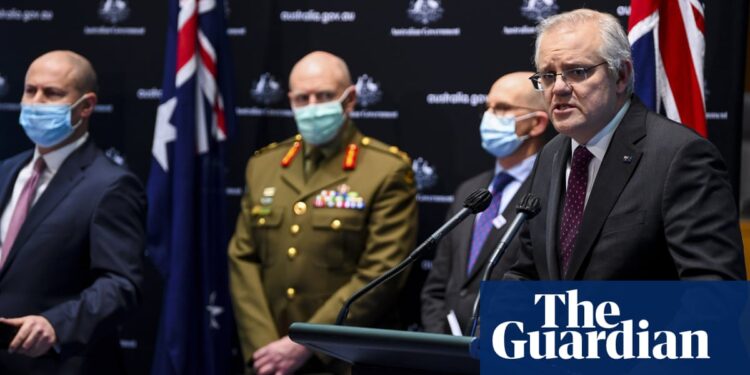Many citizens lost trust in Australian governments through the early Covid period and rebuilding that faith for future health emergencies is vital, the federal government’s inquiry into the pandemic has warned.
The long-awaited report into Australia’s Covid response said national cabinet must be less secretive with its decision-making in future. Delays in procuring the vaccine, and its distribution, had a direct economic cost estimated at $31bn, the report said.
The report stressed tough pandemic response measures, including lockdowns and movement restrictions, are unlikely to be accepted again.
Many still feel “resentment about what they lost” during the pandemic, and governments need to “rebuild the social fabric”, respondents told the inquiry. “Trust has also been eroded,” the report said.
Speaking after the report was made public, the health minister, Mark Butler, said it was clear Australia’s pre-existing pandemic plans had been “grossly inadequate” for the challenge of Covid. He also said Australia was “arguably worse-placed” to deal with a pandemic now than in 2020.
Butler raised concern about the burnout on healthcare systems, health workers and public servants.
The treasurer, Jim Chalmers, quickly sought to paint the multi-billion-dollar economic cost of Covid as an indictment of the former Coalition government, and blamed the pandemic for inflation Labor is still struggling to curb.
“Big decisions were taken and big mistakes were made,” he said of the Morrison government.
“Those mistakes were costly and they were inflationary.”
Less ‘stick’, more ‘carrot’
The report said “critical gaps” remain in recovering from the pandemic, including mental health support for young people and how to catch up on a decline in how key health measures were delivered.
It recommended future responses be less focused on “stick” approaches, or punishments, and focus more on “carrot” encouragements such as vaccine mandates.
The inquiry, set up by the Albanese government in September 2023, had been asked to deliver recommendations to improve the country’s preparedness for future pandemics.
The 868-page report, released on Tuesday, sets out 26 “actions” and nine “guiding recommendations” for governments.
The report’s panel – epidemiologist professor Catherine Bennett, health economist Dr Angela Jackson, and the former director general of the NSW health department Robyn Kruk – praised much of Australia’s response to the pandemic, noting relative success in reducing deaths and infections. But there were “gaps” in the national response.
Vaccine delays cost lives and the economy $31bn
Concerns were raised about the speed of decision-making and the communication of how and why decisions were made.
“The delays in vaccine procurement and distribution, further complicated by concerns over serious side effects, ultimately affected the duration of the vaccine rollout and prolonged restrictive public health measures. The additional lockdowns that occurred as a result of these delays had a direct economic cost estimated at $31 billion,” the report said. The Australia Bureau of Statistics recorded 21,827 deaths between March 2020 and January 2024 of people who died from or with Covid.
Transparency is vital if freedoms are cut
One major recommendation was that national cabinet, the meeting of federal and state leaders, and other key decision-making bodies “should be more transparent in disclosing the expert advice that underpins their decisions”.
after newsletter promotion
“This should include the rationale for why decisions are being made that result in significant reduction of freedoms,” the report stated.
The report was critical that national cabinet’s “unity of purpose” waned as the emergency continued and trust between leaders “eroded”.
Decisions in the future should be made with greater input from risk assessment and communications experts, the report said, and “trusted spokespeople and community voices” should help communicate those changes.
“There is a job to be done to rebuild trust, and we must plan a response based on the Australia we are today, not the Australia we were before the pandemic,” the report said.
The problem of lingering resentments
New principles should be developed “in partnership with science communication experts” to ensure evidence and advice is easily interpreted by ordinary citizens, the report recommended.
“People told us that, since the COVID-19 pandemic, there continues to be resentment about what they lost (e.g. choice, connections, freedoms and autonomy). Focus groups suggested a need to rebuild the social fabric of society as this will be critical to effective management in future public health emergencies,” the report added.
Focus groups said their trust in governments declined over a lack of transparency, poor communication, the severity of restrictions and differing rules between jurisdictions.
Centre for Disease Control needed
The Australian Centre for Disease Control, set up by Labor, but still in an embryonic state, should play a key role, the report said. Such a body, like its equivalent in the United States, could help communicate information as a trusted voice and explain decisions.
On Tuesday, the report’s release was accompanied by $252m to formally set up the CDC, which is currently operating as an interim body.
“When attempting to encourage adherence to restrictions, the focus should be on appropriate policy levers and mechanisms to drive behaviours, goodwill, openness to information and trust, rather than the ‘stick‑based’ approaches that are often perceived as ‘punitive’ and ‘forceful’,” the report said.
The CDC would also help in monitoring real-time statistics around virus spread, the report said. This could help target responses such as social restrictions or workplace furloughing.
The report, commissioned in September 2023, had been given a 12-month timeframe, to report back in September 2024. However at the end of last month, Guardian Australia revealed the inquiry had been given an extension.







